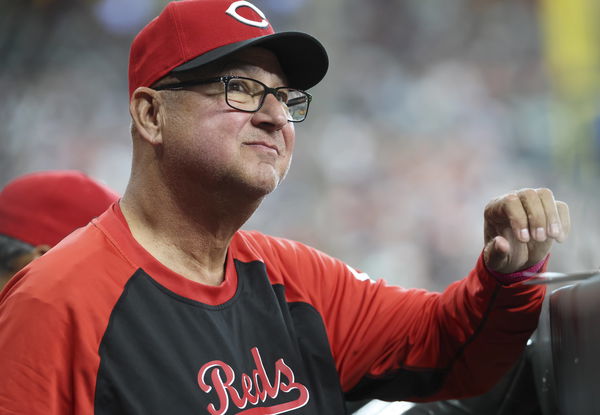
via Imago
MLB, Baseball Herren, USA Cincinnati Reds at Houston Astros May 11, 2025 Houston, Texas, USA Cincinnati Reds manager Terry Francona 77 looks on from the dugout during the game against the Houston Astros at Daikin Park. Houston Daikin Park Texas USA, EDITORIAL USE ONLY PUBLICATIONxINxGERxSUIxAUTxONLY Copyright: xTroyxTaorminax 20250511_tjt_at5_0018

via Imago
MLB, Baseball Herren, USA Cincinnati Reds at Houston Astros May 11, 2025 Houston, Texas, USA Cincinnati Reds manager Terry Francona 77 looks on from the dugout during the game against the Houston Astros at Daikin Park. Houston Daikin Park Texas USA, EDITORIAL USE ONLY PUBLICATIONxINxGERxSUIxAUTxONLY Copyright: xTroyxTaorminax 20250511_tjt_at5_0018
The Cincinnati Reds have spent years trying to thread the needle between building for the future and pushing for the present. After a surprising 2024 season that saw them flirt with contention, the front office faced pressure to make a splash, something bold, something that said we’re serious now. But in baseball, not all bold moves age well. And when a small-market team bets big, the margin for error shrinks fast.
That’s what makes this one sting a little more. Reds fans know the stakes. They’ve seen the franchise pinch pennies, let stars walk, and miss out on key free agents. So when a front office suddenly opens the checkbook, expectations skyrocket. The move has to hit. The player has to produce. And if it doesn’t? The backlash is swift and unforgiving.
That’s exactly what’s unfolding after the Reds’ acquisition of Ke’Bryan Hayes from the Pittsburgh Pirates in exchange for reliever Taylor Rogers, shortstop prospect Sammy Stafura, and cash. Once hailed as a defensive savant, Hayes comes with a hefty $38 million price tag through 2029. And while his glove remains elite, his bat continues to drag, raising eyebrows across the league. Some insiders are already calling it the “worst trade” of the deadline.
ADVERTISEMENT
Article continues below this ad

via Imago
Boston, MA- 4/10/25- Boston Red Sox catcher Carlos Narvaez (right) and relief pitcher Justin Wilson (32) react after a Toronto Blue Jays run during the seventh inning at Fenway Park. (Danielle Parhizkaran/Globe Staff)
Here’s the issue: Hayes, despite his two Gold Gloves, hasn’t been able to string together consistent offensive production. Over his last 100 at-bats, Hayes has slashed a pedestrian .230 with an average of just three home runs per season. That kind of offensive production doesn’t scare pitchers or justify a long-term financial commitment. And it certainly doesn’t scream “cornerstone piece” for a team trying to leapfrog the crowded NL Central.
Meanwhile, Pittsburgh walks away with a controllable bullpen piece in Rogers and a high-upside infield prospect in Stafura, plus cash. In other words, the Pirates managed to shed a contract, upgrade their future, and patch a present-day need, all in one deal.
Reds fans wanted commitment. They got it. But this trade feels less like a savvy step forward and more like an expensive leap of faith. For a team trying to rise in a crowded division, every dollar matters. And right now, Cincinnati’s big swing is looking more like a costly miss.
ADVERTISEMENT
Article continues below this ad
Numbers behind the Reds’ offensive struggles
There’s no denying the highlight reels. At third base, Ke’Bryan Hayes is as smooth as they come, diving stops, quick transfers, and laser throws that routinely steal extra bases from hitters. Defensively, he is hands down the top tier in the league. Last year was a standout for him with numbers that put him near the top in both Outs Above Average (OAA) and Defensive Runs Saved (DRS), solidifying his reputation as a vacuum at the base. But while the glove dazzles, it’s the bat that continues to drag him down, and now, it’s dragging the Reds into a $38 million question mark.
What’s your perspective on:
Is Ke'Bryan Hayes worth the $38 million gamble, or did the Reds overpay?
Have an interesting take?
Let’s look at the numbers. As we already mentioned over the last 100 plate appearances in 2025, the third baseman only managed .237/.284/.294, and an OPS that sits at .578, well below the league average MLB hitter. Also, he’s hit just three home runs all season, hardly what you expect from a corner infielder. In 2024, he posted a ground ball rate of 51.2%. That’s an issue because it severely limits his power potential. When you’re hitting the ball on the ground that often, you just aren’t going to do damage at the plate.
The most frustrating part for Reds fans? He’s shown flashes. In the second half of 2023, Hayes hit .271 with 15 homers, 61 runs batted in, and a .762 OPS in 124 games. That makes you think there might be a hitter hiding behind that defense. He’s shown flashes of brilliance, but they’ve been few and far between. Since coming in 2025, it’s like he’s fallen back into his ways. He’s chasing pitches, having trouble getting the ball in the air, and not doing much to help out in the middle of the lineup. It’s frustrating to watch because you know he’s capable of more.
ADVERTISEMENT
Article continues below this ad
For a player now carrying a $38 million commitment, the glove alone just isn’t enough. Not when every bat in the order matters, and not when the bat in question is this cold.
Top Stories
ADVERTISEMENT
ADVERTISEMENT
ADVERTISEMENT
ADVERTISEMENT



Is Ke'Bryan Hayes worth the $38 million gamble, or did the Reds overpay?